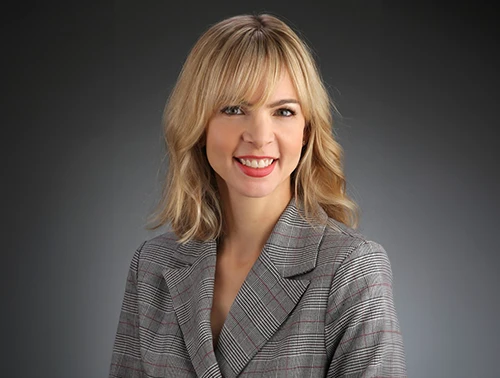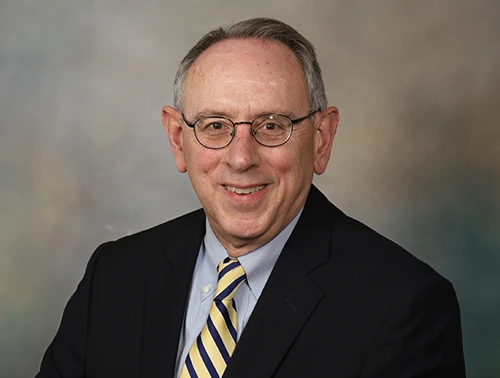The Laurie Green, MD Volunteer of the Year Award is given annually to a physician volunteer who represents excellence in every aspect of service to MAVEN Project. We are honored to present the 2024 Volunteer of the Year Award to Carrie Horwitch, MD.
Can you talk about the need for expertise in internal medicine in underserved communities?
Internal medicine is a broad specialty. As an educator, I’ve spent a lot of time on three topics: taking care of patients with HIV, patients who are transgender, and patients with sexually transmitted infections. I focus on common, key points that clinicians can start using immediately. A lot of clinics don’t have access to continuing medical education, and conferences are very expensive to attend. My lectures focus on what clinicians need to know in order to practice in their setting—for example, how to manage limited resources and navigate change.
Can you share some reflections on your experience teaching medicine overseas?
I spent several years working for a couple organizations when we were doing what would be considered the scale-up for HIV care. I worked in different African countries and kept the mantra I’m training myself out of a job. Because the goal was not for us to stay long-term and provide care; it was to build capacity. We gave people the tools to do the care themselves, and then to teach and mentor others. In short, we were there to work on system development.
In what ways do you believe MAVEN Project can help bridge gaps in care, especially for patients in remote or underserved areas?
I’ve been in medicine for over 30 years, and I’ve worked in a variety of settings both in the US and internationally. MAVEN Project offers highly beneficial and cost-efficient support to clinicians with otherwise limited resources. Giving them ready access to specialists for consults and mentoring is, frankly, golden.
My grandfather used to say, “education is something no one can ever take away from you.” As a volunteer, I get to keep giving back with skills I’ve honed my whole life—teaching, training, and building capacity.
As an educator and adviser to other clinicians, what wisdom from your own experience as a practitioner do you invoke most often?
There’s a perception in medicine that practitioners know everything, but of course we don’t. The three most important words we need to feel comfortable saying are I don’t know. What matters is knowing which resources to consult to figure out how to care for a patient. As a mentor, I really try to reinforce that confidence in challenging circumstances. I also work with mentees on agenda setting: How do you practice efficiently and still maintain your compassion and acumen in an extremely time-limited setting?
We’re human. It’s impossible to know everything. But being good at taking medical history and conducting a physical exam—that’s 95 percent of internal medicine, so it’s where we need to focus our energy.
What do you see as the roots of challenges for safety net clinicians?
Two universal challenges in health care—lack of insurance coverage and high administrative burdens—are especially acute in community health settings, and even more so in rural areas. Being a practitioner is not simply about seeing a patient and taking care of them. We have to follow government regulations and payment requirements, plus manage electronic health records that were designed by businesspeople, not medical professionals. Lots of these administrative tasks are couched in language about patient safety and improved care, but that’s not always true, and it’s very hard to change.
And a lot of this only comes into play if your patient has access to health care, which is a problem everywhere but especially in rural areas.
I often say that advocacy is an antidote to burnout. Where we can, clinicians need to push for change to make our system better.
One aspect of community health that’s easy to overlook is that many practitioners have limited clinical experience before stepping into primary care roles. How do MAVEN Project’s physician volunteers support them?
It’s true that physicians log many more clinical hours in their residency and training than nurse practitioners and physician assistants, who provide a lot of the primary care in safety net clinics. This actually reinforces the importance of knowing how to conduct a really good clinical exam over knowing everything about medicine.
The most valuable skill clinicians can have is knowing how to communicate with patients to understand their history and what’s going on with them now. Then, if they’re not sure how to proceed, MAVEN Project volunteers can apply our years of clinical experience to help them determine the most likely causes, other factors the clinician may need to consider, and what the next steps should be. Essentially, we are an extension of the patient’s clinical care team.
Looking back on your career, what accomplishment are you most proud of?
At my clinic, I changed our appointment lengths from 15 minutes to 30 minutes. It made such a difference in the well-being and satisfaction of both patients and clinicians. I use this as an example of the kind of systems change we need—it’s pushing back on assumptions that we have to do things a certain way, and it’s a solution geared as much toward those providing care as those receiving it. It’s hard to make that kind of change happen. But particularly in underserved communities, where social determinants of health mean more complex illnesses, it simply takes more time to help those patients. Some need more than half an hour! So these changes are worth pushing for.
How does that achievement continue to influence how you advise others in their practices?
I think we need to recognize that whoever decided how long an appointment should be has probably never treated a patient. Standard appointment lengths are decided by data, not medicine.
Clinic leaders need to have the emotional intelligence to listen to concerns from those providing care as well as patients, and be as flexible as possible in trying new things to promote better conditions for everyone. One way of doing that is lengthening appointments.
Why is MAVEN Project’s model, which focuses on peer-to-peer connections between practitioners, the most effective way to improve patient outcomes?
Sustainable growth and development are critically important in medicine and have been huge themes throughout my career. By educating clinicians and raising their awareness, capability, and capacity, we are doing so much more for patients—for our entire country—than we could by addressing one patient at a time. I’m in a cognitive specialty, which means I don’t do a lot of procedures. Internal medicine is all in the patient’s history and physical exam, which take time to understand. It’s why I focus on agenda setting—helping clinicians work more effectively and efficiently, which ultimately saves them time. MAVEN Project’s greatest strength is that it is building capacity in health care when and where it is most needed.





